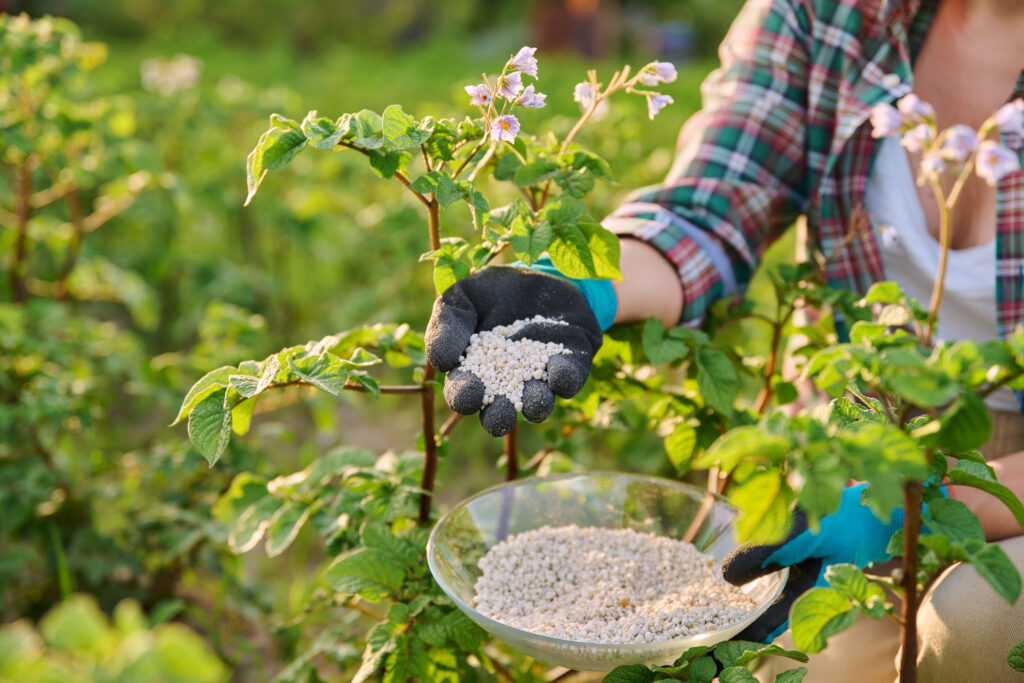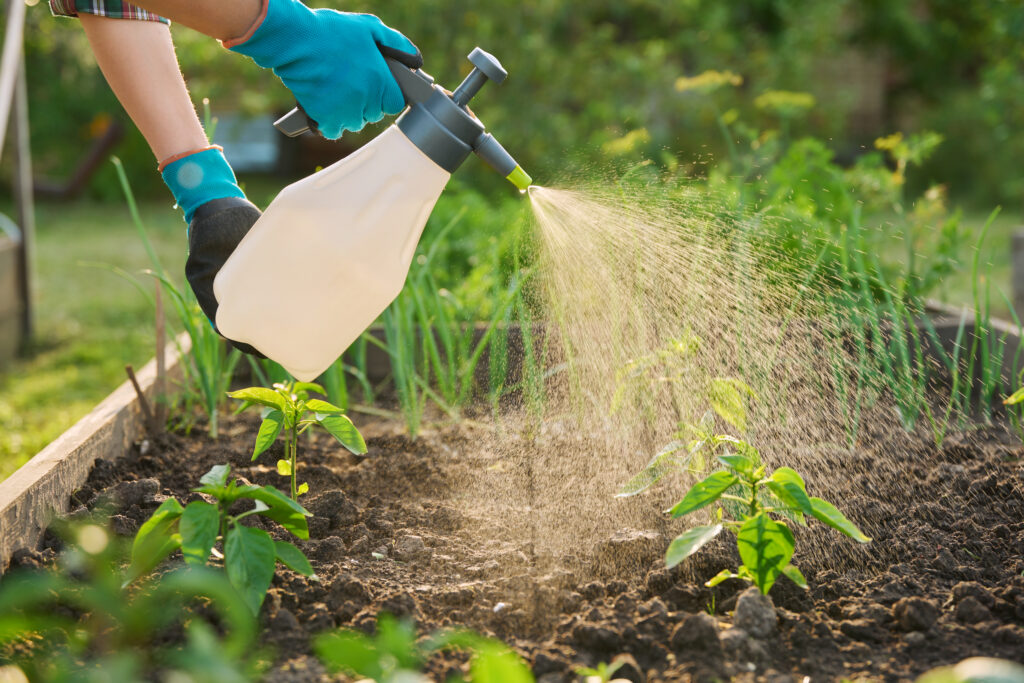Introduction
Organic gardening is all about working in harmony with nature, and that means using fertilizers and pesticides that are both effective and environmentally friendly. If you’re looking to boost your garden’s health without synthetic chemicals, you’ve come to the right place. In this guide, we’ll cover the best organic fertilizers and pesticides that will help your garden thrive while keeping it chemical-free.

Why Choose Organic Fertilizers and Pesticides?
Organic fertilizers and pesticides are made from natural materials, ensuring that your garden remains healthy without harming the environment. Unlike synthetic options, organic solutions nourish the soil and plants over time, improving soil structure and fostering beneficial organisms. They also reduce the risk of chemical runoff, which can contaminate local water sources and harm wildlife.
Best Organic Fertilizers for Your Garden
Fertilizers are essential for supplying plants with the nutrients they need to grow strong and healthy. Organic fertilizers do this without synthetic chemicals, providing a slow-release source of nutrients that enrich the soil over time.
a) Compost
Compost is a gardener’s best friend. Made from decomposed organic materials like kitchen scraps, leaves, and grass clippings, compost adds essential nutrients and improves soil texture.
- Key Nutrients: Nitrogen, phosphorus, potassium (N-P-K), and trace minerals.
- How to Use: Mix compost into your soil or top-dress around plants.
b) Worm Castings
Worm castings are the nutrient-rich waste produced by earthworms. These natural fertilizers are packed with beneficial microbes that boost plant growth and improve soil health.
- Key Nutrients: Nitrogen, potassium, calcium, magnesium, and beneficial microorganisms.
- How to Use: Mix worm castings into potting soil or sprinkle them around plants as a slow-release fertilizer.
c) Fish Emulsion
Fish emulsion is a liquid fertilizer made from fish waste. It’s an excellent source of nitrogen, which is crucial for leaf and stem development.
- Key Nutrients: High in nitrogen, with some phosphorus and potassium.
- How to Use: Dilute with water (usually 1 tablespoon per gallon) and use as a foliar spray or water directly onto the soil.
d) Seaweed/Kelp Fertilizer
Seaweed or kelp fertilizers are rich in trace minerals and plant growth hormones. These fertilizers help plants resist stress, improve root growth, and boost fruiting and flowering.
- Key Nutrients: Trace minerals (zinc, iron, magnesium), plant growth hormones (cytokinins).
- How to Use: Dilute as directed and use as a foliar spray or soil drench.
e) Bone Meal
Bone meal is a powdered organic fertilizer made from ground animal bones. It is high in phosphorus, which is essential for root development and flowering.
- Key Nutrients: High in phosphorus and calcium.
- How to Use: Sprinkle bone meal into the soil before planting or around established plants.
f) Blood Meal
Blood meal is a nitrogen-rich organic fertilizer made from dried animal blood. It is fast-acting and helps boost leaf and stem growth.
- Key Nutrients: High in nitrogen.
- How to Use: Apply sparingly, as too much nitrogen can burn plants. Follow the manufacturer’s instructions.
Best Organic Pesticides for Your Garden
Pest control is a crucial part of organic gardening. Organic pesticides help manage pest populations without harming beneficial insects or the environment. Below are some of the best natural options for keeping your garden pest-free.
a) Neem Oil
Neem oil is a natural pesticide derived from the seeds of the neem tree. It works by disrupting the life cycle of pests, preventing them from feeding, growing, and reproducing.
- Effective Against: Aphids, whiteflies, spider mites, and other soft-bodied insects.
- How to Use: Mix with water and spray directly onto affected plants. Reapply every 7-14 days.
b) Insecticidal Soap
Insecticidal soap is a simple and effective way to control soft-bodied pests. The soap works by penetrating the insect’s outer shell, causing dehydration and death.
- Effective Against: Aphids, spider mites, whiteflies, and mealybugs.
- How to Use: Spray directly onto pests, ensuring thorough coverage of the undersides of leaves. Reapply as needed.
c) Diatomaceous Earth
Diatomaceous earth is a fine powder made from fossilized algae. It kills pests by damaging their exoskeletons, causing them to dehydrate and die.
- Effective Against: Slugs, snails, ants, and other crawling insects.
- How to Use: Sprinkle diatomaceous earth around the base of plants or on pest-infested areas.
d) Bacillus Thuringiensis (Bt)
Bt is a natural bacterium that targets specific insects without harming beneficial insects, animals, or humans. It’s particularly effective against caterpillars and larvae.
- Effective Against: Caterpillars, beetle larvae, and mosquito larvae.
- How to Use: Spray Bt directly onto the affected plants, especially where caterpillars are feeding.
e) Garlic Spray
Garlic has natural antibacterial and antifungal properties, and it also works as a deterrent for pests. Garlic spray is an inexpensive, homemade organic pesticide that can help keep many pests at bay.
- Effective Against: Aphids, ants, and some beetles.
- How to Use: Crush a few cloves of garlic and steep them in water. Strain the mixture and spray it on your plants.
f) Pyrethrin
Pyrethrin is a natural pesticide derived from chrysanthemum flowers. It is fast-acting and effective against a wide variety of pests, but it also breaks down quickly, reducing its impact on the environment.
- Effective Against: Beetles, aphids, caterpillars, and flies.
- How to Use: Apply as a spray in the early morning or late evening to avoid harming beneficial insects.
How to Use Organic Fertilizers and Pesticides Effectively

While organic products are safer for the environment, it’s important to use them correctly to avoid overuse or unintended harm to plants and beneficial insects. Follow these best practices:
- Read Labels: Always follow the manufacturer’s instructions for mixing and application.
- Apply During Optimal Conditions: Apply fertilizers and pesticides during early morning or late afternoon to minimize evaporation and maximize absorption.
- Avoid Over-Fertilizing: Even organic fertilizers can lead to nutrient imbalances if over-applied. Stick to recommended amounts to ensure plant health.
- Target Pesticides Carefully: Use pesticides only where pests are present to avoid harming beneficial insects.
Benefits of Organic Fertilizers and Pesticides
By using organic fertilizers and pesticides, you’re not only improving your garden’s health but also promoting sustainable gardening practices. Here’s how:
- Environmental Protection: Organic products are less likely to contribute to pollution, keeping ecosystems healthy.
- Soil Health: Organic fertilizers build long-term soil health by improving its structure and biodiversity.
- Safe for Wildlife and Pets: Organic solutions are safer for beneficial insects, pollinators, and animals that may visit your garden.
- Chemical-Free Produce: Growing with organic methods ensures that your fruits and vegetables are free from harmful chemicals, making them safer to eat.
Final Thoughts
Using organic fertilizers and pesticides is an excellent way to maintain a healthy, thriving garden while protecting the environment. Whether you’re growing vegetables, fruits, or flowers, incorporating these natural solutions will improve soil health, control pests, and enhance your garden’s productivity. By adopting these sustainable practices, you’re making a positive impact on your garden and the world around you.
